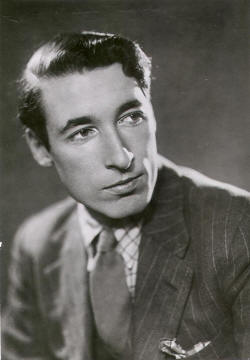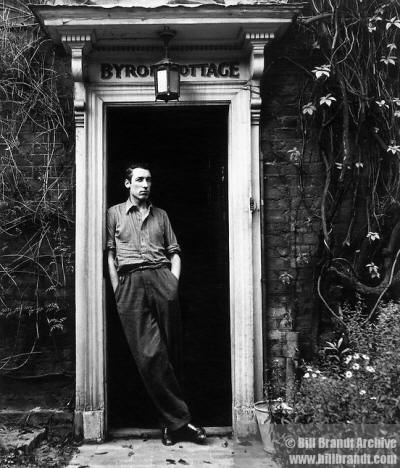

Queer Places:
Macneice Fold, North Road, Carrickfergus, County Antrim, BT38 8XP
Sherborne Preparatory School, Abbey Rd, Sherborne DT9 3AP
University of Oxford, Oxford, Oxfordshire OX1 3PA
43 Gloucester Cres, London NW1 7EB, UK
Carrowdore Church of Ireland Churchyard
Carrowdore, County Down, Northern Ireland
 Frederick Louis MacNeice CBE (12 September 1907 – 3 September 1963) was an Irish poet and playwright from Northern Ireland, and a member of the Auden Group, which also included
W. H. Auden,
Stephen Spender and
Cecil Day-Lewis. MacNeice's body of work was widely appreciated by the public during his lifetime, due in part to his relaxed but socially and emotionally aware style. Never as overtly or simplistically political as some of his contemporaries, he expressed a humane opposition to totalitarianism as well as an acute awareness of his roots.
MacSpaunday in Roy Campbell's
Talking Bronco (1946) is a composite of W. H. Auden,
Stephen Spender and
Louis MacNeice.
Frederick Louis MacNeice CBE (12 September 1907 – 3 September 1963) was an Irish poet and playwright from Northern Ireland, and a member of the Auden Group, which also included
W. H. Auden,
Stephen Spender and
Cecil Day-Lewis. MacNeice's body of work was widely appreciated by the public during his lifetime, due in part to his relaxed but socially and emotionally aware style. Never as overtly or simplistically political as some of his contemporaries, he expressed a humane opposition to totalitarianism as well as an acute awareness of his roots.
MacSpaunday in Roy Campbell's
Talking Bronco (1946) is a composite of W. H. Auden,
Stephen Spender and
Louis MacNeice.
Louis MacNeice (known as Freddie until his teens, when he adopted his middle name) was born in Belfast, the youngest son of John Frederick and Elizabeth Margaret ("Lily") MacNeice.[1] Both were originally from the West of Ireland. MacNeice's father, a Protestant minister, would go on to become a bishop of the Church of Ireland and his mother Elizabeth Cleshan, from Ballymacrony, County Galway, had been a schoolmistress. The family moved to Carrickfergus, County Antrim, soon after MacNeice's birth.[1] When MacNeice was six, his mother was admitted to a Dublin nursing home suffering from severe depression and he did not see her again. She survived uterine cancer but died of tuberculosis in December 1914.[1] MacNeice later described the cause of his mother's death as "obscure", and blamed his mother's cancer on his own difficult birth. His brother William, who had Down's syndrome, had been sent to live in an institution in Scotland during his mother's terminal illness. In 1917, his father remarried to Georgina Greer and MacNeice's sister Elizabeth was sent to board at a preparatory school at Sherborne, England. MacNeice joined her at Sherborne Preparatory School later in the year.[1]
MacNeice was generally happy at Sherborne, which gave an education concentrating on the Classics (Greek and Latin) and literature (including the memorising of poetry). He was an enthusiastic sportsman, something which continued when he moved to Marlborough College in 1921, having won a classical scholarship. Marlborough was a less happy place, with a hierarchical and sometimes cruel social structure, but MacNeice's interest in ancient literature and civilisation deepened and expanded to include Egyptian and Norse mythology. In 1922, he was invited to join Marlborough's secret 'Society of Amici'[2] where he was a contemporary of John Betjeman and Anthony Blunt, forming a lifelong friendship with the latter. He also wrote poetry and essays for the school magazines.[3] By the end of his time at the school, MacNeice was sharing a study with Blunt and also sharing his aesthetic tastes, though not his sexual ones; Blunt said MacNeice was "totally, irredeemably heterosexual". In November 1925, MacNeice was awarded a postmastership to Merton College, Oxford,[4] and he left Marlborough in the summer of the following year. He left behind his birth name of Frederick, his accent and his father's faith, although he never lost a sense of his Irishness;[1] (the BBC radio premiere of MacNeice's The Dark Tower in 1947, was preceded by the poet's ten-minute introduction in his distinctive Northern Irish accent.)[5]


It was during his first year as a student at Oxford that MacNeice first met W. H. Auden, who had gained a reputation as the university's foremost poet during the preceding year. Stephen Spender and Cecil Day-Lewis were already part of Auden's circle, but MacNeice's closest Oxford friends were John Hilton, Christopher Holme and Graham Shepard, who had been with him at Marlborough. MacNeice threw himself into the aesthetic culture, publishing poetry in literary magazines The Cherwell and Sir Galahad, organising candle-lit readings of Shelley and Marlowe, and visiting Paris with Hilton. Auden would become a lifelong friend who inspired MacNeice to take up poetry seriously.[3] In 1928 he was introduced to the Classics don John Beazley and his stepdaughter Mary Ezra. A year later he thought to soften the news that he had been arrested for drunkenness by telegraphing his father to say he was engaged to be married to Mary. John MacNeice (by now Archdeacon of Connor, and a Bishop a few years later) was horrified to discover his son was engaged to a Jew, while Ezra's family demanded assurances that Louis's brother's Down's syndrome was not hereditary. Amidst this turmoil MacNeice published four poems in Oxford Poetry, 1929 and his first undergraduate collection Blind Fireworks (1929). Published by Gollancz,[1] the volume was dedicated to "Giovanna" (Mary's full name was Giovanna Marie Thérèse Babette [1908-1991]). In 1930 the couple were married at Oxford Register Office, neither set of parents attending the ceremony. He was awarded a first-class degree in literae humaniores, and had already gained an appointment as Assistant Lecturer in Classics at the University of Birmingham.[1][4]
MacNeice was awarded the CBE in the 1958 New Year's Honours list.[4] A South African trip in 1959 was followed by the start of his final relationship, with the actress Mary Wimbush, who had performed in his plays since the forties. Hedli asked MacNeice to leave the family home in late 1960. In early 1961, Solstices was published, and in the middle of the year MacNeice became a half-time employee at the BBC, leaving him six months a year to work on his own projects. By this time he was "living on alcohol", and eating very little, but still writing (including a commissioned work on astrology, which he viewed as "hack-work"). In August 1963 he went caving in Yorkshire to gather sound effects for his final radio play, Persons from Porlock. Caught in a storm on the moors, he did not change out of his wet clothes until he was home in Hertfordshire. Bronchitis evolved into viral pneumonia, and he was admitted to hospital in London on 27 August, dying there on 3 September, aged 55.[8][3] He was buried in Carrowdore churchyard in County Down, with his mother.[3] His final book of poems, The Burning Perch, was published a few days after his funeral – W. H. Auden, who gave a reading at MacNeice's memorial service, described the poems of his last two years as "among his very best".
My published books: